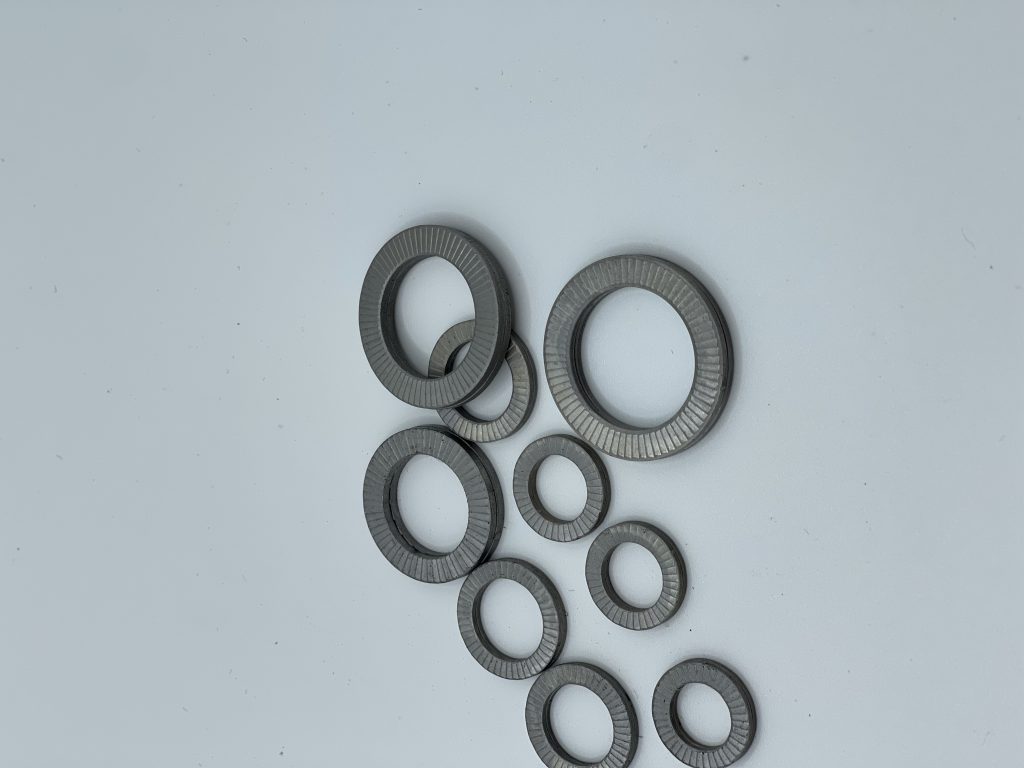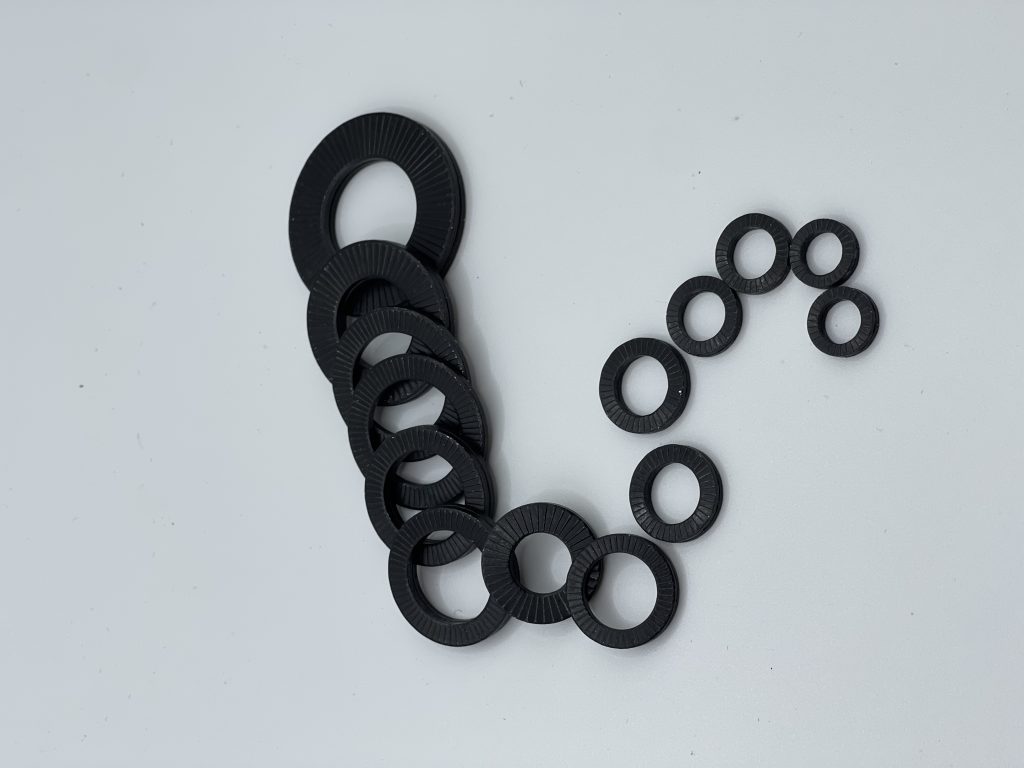

A lock washer, also known as a locking washer or a helical spring washer, is a type of mechanical fastener used to prevent nuts, bolts, screws, and other threaded fasteners from loosening due to vibration or rotation.
Lock washers are typically made of spring steel, and they have a unique design that allows them to apply a constant tension between the fastener and the mating surface, which helps to prevent the fastener from coming loose. There are several types of lock washers, including split washers, star washers, and toothed washers, among others.
Split washers are the most common type of lock washer and consist of a washer that is split at one point and bent into a helical shape. When the fastener is tightened, the washer exerts a spring-like force, which helps to maintain the tension and prevent loosening.
Star washers have a star-shaped profile and work in a similar way to split washers, applying a spring-like force to keep the fastener tight. Toothed washers have teeth that bite into the surface of the material, helping to prevent movement and loosening.
Overall, lock washers are a simple but effective way to ensure that threaded fasteners remain secure and tight in various mechanical applications.
Performance and advantages of lock washer
Lock washers provide several benefits and advantages, including:
Improved fastener retention: Lock washers help to prevent nuts, bolts, screws, and other fasteners from loosening due to vibration or rotation. The spring-like force applied by the washer maintains tension, which helps to keep the fastener secure and tight.
Enhanced stability: The use of lock washers helps to improve the stability and overall performance of mechanical systems by ensuring that fasteners remain securely in place. This can be particularly important in high-stress or high-vibration environments, such as those found in industrial or automotive applications.
Cost-effective solution: Lock washers are a simple and cost-effective solution for improving fastener retention. They can be easily installed and do not require any special tools or equipment.
Versatile: Lock washers are available in a range of sizes and designs, making them suitable for use in a variety of applications and environments. They can be used with different types of fasteners and in different materials, including metals, plastics, and composites.
Reduced maintenance: By preventing fasteners from loosening, lock washers can help to reduce the need for maintenance and repairs, which can save time and money over the long term.
In summary, lock washers are a reliable and effective way to improve fastener retention, stability, and performance in mechanical systems. Their versatility and cost-effectiveness make them a popular choice in a variety of industries and applications.
Application environment of lock washer
Lock washers can be used in a wide range of application environments where it is necessary to prevent fasteners from loosening due to vibration, shock, or other forces. Some common examples of application environments where lock washers are used include:
Automotive: Lock washers are commonly used in automotive applications to prevent fasteners from loosening due to the vibration and shock that occurs while driving. They are often used in engine components, suspension systems, and other critical areas where stability and reliability are essential.
Industrial machinery: Lock washers are widely used in industrial machinery, such as pumps, compressors, and generators, to prevent fasteners from loosening due to the high levels of vibration and stress that occur during operation.
Construction: Lock washers are commonly used in construction applications to secure bolts and screws in structural components, such as steel beams and concrete foundations.
Aerospace: Lock washers are used in aerospace applications to prevent fasteners from loosening due to the high levels of vibration and stress that occur during flight.
Marine: Lock washers are used in marine applications to prevent fasteners from loosening due to the constant exposure to saltwater and other corrosive elements.
Overall, lock washers are a versatile and reliable fastener solution that can be used in a wide range of application environments to improve stability, reliability, and performance.
Material standard treatment of lock washer
Lock washers are typically made of high-quality spring steel, which has excellent elasticity and durability. However, depending on the application environment and specific requirements, lock washers can also be made of other materials such as stainless steel, brass, aluminum, or plastic.
The material of the lock washer can affect its performance and longevity. For example, stainless steel lock washers are ideal for use in environments where corrosion is a concern, such as marine or outdoor applications, while plastic lock washers may be suitable for use in low-stress applications or in applications where weight is a concern.
In terms of standard treatments, lock washers can be treated with various coatings or finishes to improve their performance and longevity. For example, zinc plating is a common treatment used to improve the corrosion resistance of lock washers. Other treatments, such as black oxide, phosphate, and cadmium plating, can also be used to improve the wear resistance or aesthetics of the lock washer.
In summary, the material and treatment of the lock washer should be chosen based on the specific application requirements, such as environmental conditions, stress levels, and other factors, to ensure optimal performance and longevity.
Standard surface treatment of lock washer material
Lock washers can be treated with various surface treatments to improve their performance and durability. Some common surface treatments include:
Zinc Plating: This is the most common surface treatment for lock washers. Zinc plating provides a protective layer that helps to prevent corrosion and rusting. It also improves the wear resistance and aesthetics of the lock washer.
Cadmium Plating: Cadmium plating provides similar benefits as zinc plating but is more expensive. It is used in applications where high corrosion resistance is required, such as in marine or aerospace applications.
Black Oxide: Black oxide is a chemical treatment that creates a black oxide coating on the surface of the lock washer. This treatment provides excellent corrosion resistance and improves the aesthetics of the lock washer.
Phosphate Coating: Phosphate coating is a chemical treatment that provides a layer of phosphate on the surface of the lock washer. This treatment improves the wear resistance and provides some corrosion protection
Anodizing: Anodizing is a process that creates a layer of oxide on the surface of the lock washer. This treatment provides excellent corrosion resistance and improves the wear resistance of the lock washer.
The choice of surface treatment for lock washer material will depend on the specific application requirements, such as the environmental conditions, stress levels, and other factors. It is important to choose a surface treatment that will provide the necessary protection and durability to ensure the optimal performance of the lock washer.

